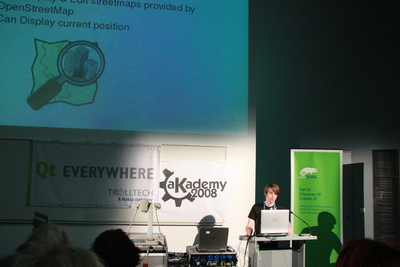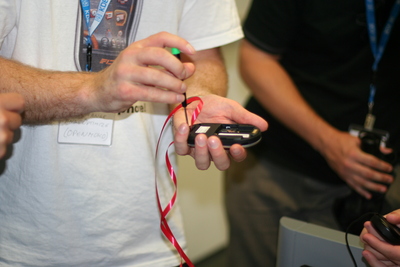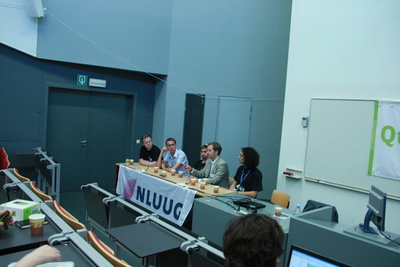Mobile and Embedded Day at Akademy
This year Akademy held a dedicated day for mobile and embedded talks. With Trolltech being owned by Nokia, mobile is suddenly a hot topic for KDE and several variants of Qt and KDE on mobiles were in progress at Akademy. Read on for an overview of the talks.
The day opened with Kate Alhola from Nokia showing off the Nokia N810. As already reported, the talk was followed by handing out the devices to the audience. Her blog says she hopes to see lots of Qt and KDE applications in Maemo Garage soon.
Koen Deforche from EmWeb showed off Wt, a Qt like toolkit for webpages. It is intended for use in embedded devices without their own display but which can run a small web server to provide their user interface. Wt itself is a C++ library which closely follows the Qt API and compiles into a programme featuring a built in web server. Wt is GPL and uses a similar dual licence to Qt for proprietary uses. If you like Qt but you need to write an embeded UI with web technologies, Wt seems like a perfect fit.
Ole Tange said he had a dream. He wanted a mobile device which was open to hacking, used free software and worked as a phone and PDA. He found his dream with the OpenMoko, a mobile phone made by FIC, a Taiwanese company who were fed up of making hardware which was then rebranded by US companies. OpenMoko has recently changed to using Qtopia, the mobile platform from Trolltech. As a free device we are able to work on ideas that do not interest companies making closed platforms, one suggestion was to programme the phone so when a salesperson calls you can have it say "press 1 if you are selling something". Another suggestion was to use the motion sensor to test if you are cycling, in which case you do not want a call. One more was to turn off the phone when in a cinema but turn it back on automatically after the film. After the talk he took out his screwdriver and showed how to take apart the device.
Bling was on show next with Leonardo Sobral Cunha and Artur Duque de Souza from OpenBOSSA showing off QEdje, a port of the Enlightenment Edje library to Qt. They make applications for Nokia N810 and other devices and showed off the slick user interfaces they have made.
Making KDE technology available to embedded devices was the theme of Eva Brucherseifer's talk. She used Decibel as an example of a KDE library that would be interesting on mobile devices. She hopes there will be more code shared between KDE and mobile platforms in future.
Student projects were the topic of the next two talks. Firstly Mickey Leroy showed off his university project which he did at the De Nayer Institute, home of Akademy (Akademy organiser Bart Cerneels from the EmSys research group was the mentor for the OpenCityMap project). Open Citymap is an application to show and edit Open Street Map from within a Qtopia device. It made maximum use of the small screen space available on a mobile device to create a usable interface. It also uses QtScript to allow plugins with custom functionality.
Knut Yrvin from Trolltech spoke about his experience of mentoring student projects in Norwegian University. Many students tended towards choosing simple projects over ambitious ones which would have results in the real world. It also takes up his time of course and as a frequent traveller he is not always able to respond quickly. Given the good results from OpenCityMap though we can hope he and Bart will continue mentoring student projects. It was also pointed out the good results we have been getting from Google Summer of Code.
Panel Discussion
The day closed with a panel discussion on the topic of Driving innovation with Open Desktop Technologies. Shane Martin Coughlin a lawyer with FSFE opened by saying he wants to make more technology available to more people and that needs free software and genuinely open standards. Aaron Seigo said free software opens doors that can span between different companies and their devices and we will see lots of crossover between different devices. Knut from Nokia said free software lets you get on without just debugging and fixing existing software.
It was asked what is it about free software that allows crossover. Aaron emphasised the social aspect. Innovation does not happen in a vacuum, with free software people can experiment more and work together. He is a desktop guy but today he is on a mobile panel, that sort of crossover does not happen outside of free software. Shane said free software gives a grant that lets people take changes and do what they want with it. The biggest challenge going with open desktop is it is more complex than any one person or company can go with. There will be technical and cultural problems crossing borders, problem is how we move forward with global developer and user base where there are different cultures. We will have to innovate with licencing and platforms.
Knut pointed out that in Africa people have mobile phones as their first computer. Only a small fraction of the world use PCs, increasingly the rest use phones first. He told us that the Trolltech CEO said the challenge to the mobile industry is it needs to change its business model from proprietary software since software is becoming commoditised, it can be installed at no cost and that will change business models in the same way as happened with the internet. The next step is letting applications flood into devices.
Aaron said that the majority of software is written on high powered computers. Not many people rushed to write apps for XO, while plenty did for the iPhone because it is a more interesting device. You can not try and bring the people writing free software now to do mobile stuff if it's not interesting and sexy for them. Instead we need to make user interfaces span from one side to the other.
Sven, a programmer from Nokia said they introduced standard libraries as a lowest common denominator. It will take time for people to learn how to do everything on small and limited devices, but we will get there. If you are able to do it you will then get much more performance from desktop devices as a result. Cross platform is important too, people using second hand machines do not have a choice about platform so it is important to be able to work on as many devices as possible.
It was asked if the desktop is still relevant. Aaron said it is massively important, we are deploying 50 million desktops in Brazil, MS and Apple have plenty more of course. It used to be desktop was the only game and embedded was maybe done by some people over there. Now desktop is on a continuum which includes embedded. As desktop developers we can question ourselves in how we build our user interfaces so they are more componentised and work on a range of devices. He challenges everyone in the audience to write software which is more aware of its environment.


